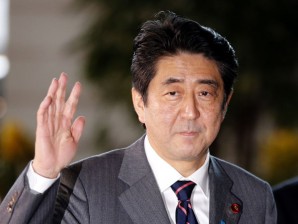Japan’s new PM to visit White House in February
WASHINGTON—The United States on Friday invited Japan’s new prime minister to the White House next month, as the Asian nation’s top diplomat signaled the government’s intent to strengthen security ties with the US.
Prime Minister Shinzo Abe’s conservative government took power last month after a sweeping election victory and faces stiff challenges in reviving a stagnant economy and managing an escalating dispute with China over an island chain in the East China Sea.
Abe is eager to make an early trip to Washington to demonstrate the US alliance is the cornerstone of his foreign policy, and wants Japan to be a bigger player on the global stage.
Secretary of State Hillary Rodham Clinton announced the White House invitation for the third week in February after meeting Foreign Minister Fumio Kishida at the State Department, and she described the U.S. relationship with Tokyo in similar terms.
“Our alliance with Japan remains the cornerstone of American engagement in the region,” Clinton told a joint news conference.
Article continues after this advertisementKishida said the security environment in the Asia-Pacific is “ever more challenging” and that cooperation between the US and Japan is “indispensable” for maintaining peace and stability.
Article continues after this advertisementFriday’s meeting took place against a backdrop of heightened tensions in Northeast Asia.
Japan and China, the world’s third- and second-largest economies, are at loggerheads over tiny, uninhabited islands, known as Diaoyu in China and Senkaku in Japan. The long-running dispute sharpened in September when Japan’s government bought some of the islands from private owners. That sparked violent protests in China, which also claims them as part of its territory.
Chinese vessels have since repeatedly ventured into what Japan considers its territorial waters. In a worrying development last week, the two sides scrambled jet fighters to the area.
The US has been counseling calm. It could be compelled to come to its ally’s defense in case of a conflict. The US has about 50,000 troops based in Japan.
Clinton said she reiterated to Kishida the US policy on its treaty obligations: that it doesn’t take a position on the sovereignty of the Senkakus but would “oppose any unilateral action that would seek to undermine Japanese administration” of the islands. She also urged the sides to manage their disagreements peacefully.
“We do not want to see any action taken by anyone that could raise tension or result in miscalculation that would undermine the peace, security and economic growth in the region,” Clinton said.
Kishida said that Japan would not concede its position that the Senkakus are Japanese territory, but added: “We intend to respond calmly so as not to provoke China.”
Later, Foreign Ministry spokesman Masaru Sato was more candid about Japan’s view on China. He said China’s military buildup was “drastically” changing the security environment in the region.
“China is trying to change the existing order by coercing or intimidation by sending their physical presence to Japanese littoral waters or airspace. We will not take provocative action but will resolutely protect our seas and air space,” he said.
“They (China) are making a gradual advance to other countries’ territories,” Sato said.
Kishida spoke of a “strong determination” to promote security and defense cooperation with the US
Abe has advocated a more active role for Japan’s military, which is kept on a very short leash under its pacifist constitution. He supports what Japan calls “collective defense” – allowing its troops to fight alongside its US ally if either comes under direct attack.
